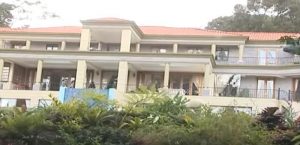Former Rarieda MP Raphael Tuju has deposited Sh50 million in court as a condition for stopping a regional bank from auctioning his property in Karen, to recover a debt of Sh1.6 billion.
In a letter to Registrar of the Court of Appeal, Mr. Tuju through his lawyer said the amount had been deposited in a joint-interest earning account.
“We write to confirm that this condition has been complied with. Our clients have deposited Kshs.50,000,000 in an interest-earning account at NCBA Bank Kenya,” the letter stated.
According to the Daily Nation, the Court of Appeal directed Jubilee Secretary-General to deposit the amount within 30 days failure to which the order will lapse and the bank was free to auction the property.
The dispute stems from a loan agreement when his company, Dari Ltd, borrowed from the bank on April 10, 2015, under which the lender agreed to give Dari a $9.3 million (Sh943.9 million).

Part of the deal was to fund the acquisition of a property in Karen known as Tree Lane and for the development and construction of residential units.
On July 8, Justice Mary Kasango declined to stop insolvency proceedings pending before the High Court and another case challenging the appointment of receiver managers, saying there was nothing to show that the money had been deposited as directed.
But Mr Tuju through Senior Counsel Paul Muite and Paul Nyamodi insist that Dari and the guarantors (Mr Tuju and his children) obtained orders stopping all the cases arising from the judgement granted by a UK court last year.
Mr Muite said the receivership was based on the loan agreement, which is the subject of appeal and that it was on that basis the appellate court stopped the cases. It was his argument that East African Development Bank had persistently frustrated Dari’s effort to repay the loan.
- Tuju arrives in UK for specialised treatment
- More woes for Tuju as his bank accounts frozen
- Raphael Tuju’s condition has improved tremendously
- Raphael Tuju airlifted to hospital after a freak road accident
Mr Tuju and his children Yma, Mano and Almo are fighting several suits pending in court, among them threats by the bank to auction their property and declare them bankrupt, for failing to repay the money.
He moved to court in January seeking to set aside the demand by the lender on the grounds that the guarantee is a secondary obligation and that the debt is secured because the principal debtor (Dari) is able and has reasonable prospects of repaying the debt.


